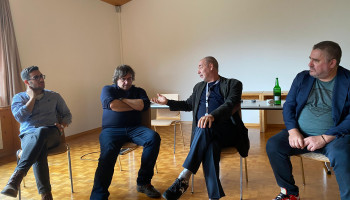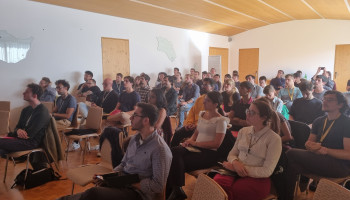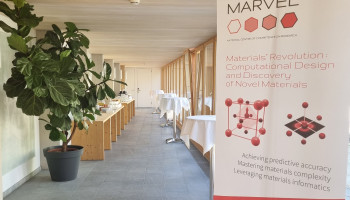Entrepreneurships and tech transfer were the core themes of the 2024 MARVEL Junior Retreat
The MARVEL Junior Retreat 2024 brough together young researchers from physics, chemistry and material science research groups working within the Swiss National Science Foundation's National Centre of Competence in Research on "Materials' Revolution: Computational Design and Discovery of Novel Materials" (NCCR MARVEL). This year's retreat focussed on entrepreneurship, technology transfer, and intellectual property rights: not only amongst different research directions but also between industry and academia. Junior scientists also go a chance to present their work, exchange ideas and enhance their soft skills.
The sixth Junior Marvel Retreat started with on 10 September with an address by MARVEL director Nicola Marzari, who put things in a wider perspective and invited everyone to look at the role of scientists in society, while asking how a “9-to-5” work culture, based on pursuing a good balance of life and work, can compete with the 24/7 work culture that is often found in the tech industry. He was followed by Roberto Siagri, founder of Rotonium, a company dedicated to the development of photonic quantum computer. He spoke on “Lessons Learned from 40 Years of Inventing, Innovating, and Empowering Change”, focussing on the key role of innovators in exploiting technology developed by inventors and leverage other people’s talents.
The world-renowned data scientists Riccardo Sabatini then spoke on the steps to build a startup, going from a new technology idea to the definition of a business model, searching for financial support, going through the various investment stages up to right time for a financial exit.
The discussion turned philosophical again with the panel discussion that closed the first day: Marzari, Siagri and Dario Villani - another physicist-turned-entrepreneur and now CEO of Duality group – discussed on the importance of including culture and history as well as sciences in the education of innovators, and invited everyone to think about the social responsibility of scientists. Marnik Bercx from PSI closed the day speaking on the issue of mental health in academia, and how to achieve a good balance of life and work.




Picture from the 2024 MARVEL Junior Retreat in St- Moritz © Virginie de Mestral.
On the second day, Villani described the core business of his company, that offers predictions based on quantum state-encoded data instead of statistics, particularly applicable to noisy data such as those needed in finance. Then it was the turn of Philip Kerpen, a physicist who now works as a professional representative before the European Patent Office, talked about patent law, offering participants a beginner’s guide on how – and why – to patent technologies.
Finally on the third day Aliaksandr Yakutovich described his own path from chemistry to IT and data science to stimulate a reflection on how to find one's way in science. Niklas Schmitz and Muhammad Hassan gave two technical talks on error quantification in Density Functional Theory.
There was also a poster competition, where participants had one minute to pitch the topic of their research in an accessible way and proposing an application useful for society. The competition was won by Davide Tisi, with the second prize going to Lorenzo Piersante, and the third to Nicolas Vetsch.
Virginie de Mestral, who co-organized the retreat with Raymond Amador, Alessandro Carbone, Gian Gentinetta and Federica Troni, says that the choice of this year’s topic proved particularly significant. “Many of us have no idea of what the real world looks like and how to protect our ideas”, she says. “Academia can be a bubble sometimes, and scientists are not trained on other aspects that are important in the industry. For example, many participants were surprised to learn that many companies active in deep tech started from the academia”.
De Mestral says that she and the other organizers received many warm thanks from the participants for putting together the retreat. “What makes this retreat significant year after year is that it provides young scientists with a space where they can combine science with creating a community, and where their problems and concerns are taken seriously".
With NCCR MARVEL entering its final phase, the next edition in 2025 will be the last Junior Retreat.
Low-volume newsletters, targeted to the scientific and industrial communities.
Subscribe to our newsletter